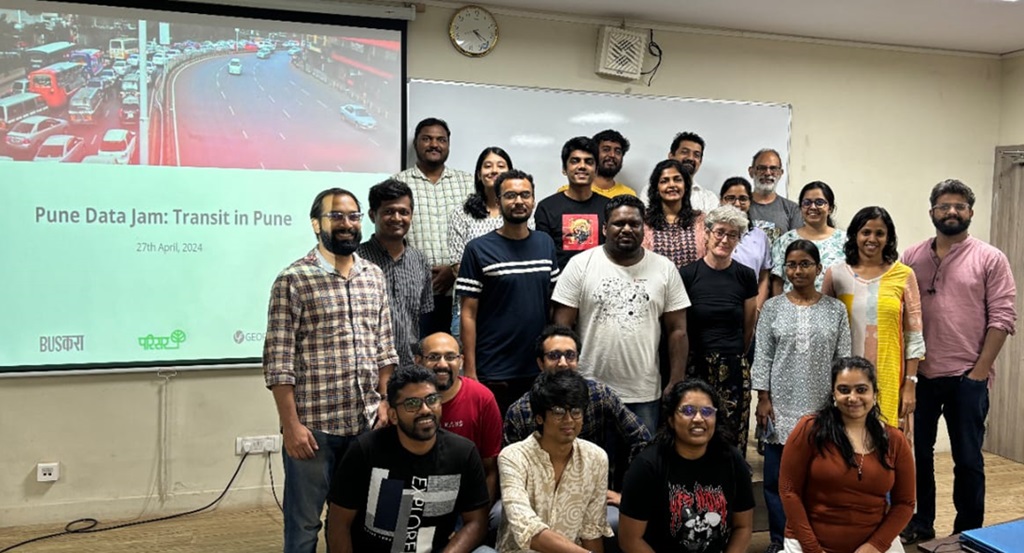Mapping Pune’s Transit Troubles: DataJam Identifies Key Issues

Pune, 28th April 2024: BusKara, in partnership with Parisar, GeoPune and Open City conducted a “datajam” on 27th April 2024 to analyse public data and look at Pune’s transport issues. The event was held at the Symbiosis School of Economics.
Pune is grappling with issues of congestion, air pollution and a resultant reduction in the city’s livability. Parisar set the context for the data jam by briefly showing the state of urban transport – growing number of private vehicles, ineffectiveness of building more roads to solve congestion and the role of non-motorized transport and public transport as the real sustainable solution to urban mobility issues.
In the day-long event, 18 participants from varied backgrounds, including urban planners, GIS experts, software developers and other active citizens joined hands to analyse public data in the context of transport – accessibility of public transport, comparison of different modes for a trip, state of cycle tracks and footpaths in the city and so on.
Facilitators Chinmay Shaligram, Nikhil Sheth and Devdatta Tengshe helped the groups formulate research questions and come up with data visualisations. Each group made a presentation of their findings at the end of the day.
The three teams looked at a variety of problem statements. While one of the teams tried to find out the connectivity and accessibility of buses to educational institutes and health care centres in selected wards of Pune. Another team looked at locations of bus stops and routes and explored to see if any correlation can be found by overlying slum population data on it. The third team compared the costs, benefits and challenges/risks in taking a specific trip using different modes of transport like bus, private aggregators and Metro.
Madhushree from BusKara said, “A crucial aspect of campaigning is building community through activities that allow people to view problems, such as climate change, from a different lens. The data jam was a great opportunity to do just that. Participants collaborated and brainstormed together to analyse transit related data in Pune. It not only shed light on how the city needs to improve for transit to become sustainable and pleasant, it also highlighted the problems with civic datasets and their importance. Most importantly, the participants had a lot of fun.”
Rugvedi, one of the participants said “I had a similar topic for my thesis. I just wanted to explore how data is being analysed, what kind of traffic issues are pressing and how I can make my thesis better. I can safely say that I had a wonderful experience and I got a few insights that I hadn’t touched upon in my work — which I will definitely consider during the later part of my thesis.”
Chinmay Shaligram of GeoPune added, “The Pune Data Jam was an excellent showcase of how opening up civic data can foster greater understanding and transparency between government agencies and the public. Participants explored the city’s public transport data, marrying location information with non-spatial data to uncover localised insights and potential areas for improvement. This event highlights the power of collaboration, bringing together active community groups to solve urban challenges through data-driven approaches. GeoPune aims to evangelise the usefulness of geospatial technologies and mapping in areas like transportation, air quality, and good governance.”






